Artificial Intelligence Development
Company
Automate, Optimize, and Innovate with Intelligent
AI Solutions.
What is Artificial Intelligence?
Artificial Intelligence (AI) helps machines think and act like humans. It learns from vast data, finds patterns, and makes smart decisions using techniques like Machine Learning, Natural Language Processing, Computer Vision, and Robotics. AI helps machines do different tasks faster and more accurately across many industries.
Artificial Intelligence Challenges & Concerns
Understanding the risks of AI is crucial for responsible development. Addressing these challenges, from bias and privacy concerns to job displacement and security risks, ensures ethical and effective AI implementation.
01
Lack of Transparency
Many AI systems, intense learning models, are like "black boxes"—they make decisions, but we don't always know how. This makes it hard to trust or understand their choices.
02
Bias and Discrimination
AI can be unfair if it learns from biased data. If an AI system is trained with unfair information, it may mistreat certain groups. We need better, more diverse training data and fairer AI designs to fix this.
03
Privacy Concerns
AI collects a lot of personal data, which can put people's privacy at risk. To keep information safe, we need strict rules on how data is stored, shared, and used.
04
Security Risks
As AI gets smarter, hackers can use it to break into systems, create fake identities, or launch cyberattacks. Strong security measures are needed to protect against these threats.
05
Compatibility Issues
Different AI systems don’t always work well together because there are no universal rules for how they should be built. One AI system might use a different format for data than another, making it difficult to share information or collaborate between systems.
05
Legal and Regulatory Challenges
AI is growing fast, but there aren't enough rules to keep it safe and fair. New rules are needed to decide who is responsible when AI makes mistakes and to protect people's rights.
06
Loss of Human Connection
As AI handles more communication, people may lose social skills and empathy. Balancing AI use with fundamental human interactions is essential to maintain strong relationships.
Artificial Intelligence Expertise
Deep knowledge and hands-on experience in building intelligent AI solutions that solve real-world problems and improve outcomes.
Machine Learning Development
Machine learning enables systems to analyze data, recognize patterns, and make informed decisions. By leveraging advanced AI models such as GPT-4, LLaMA, and PaLM 2, machine learning enhances predictive analytics and improves various applications.

Computer Vision Development
Computer vision enables machines to analyze images and videos, supporting applications like object detection, facial recognition, and biometric authentication. Technologies such as Python, OpenCV, and PyTorch enhance accuracy and efficiency.

NLP Development
NLP (Natural Language Processing) enables machines to understand and process human language for tasks like language translation, speech recognition, and sentiment analysis. Models like GPT-4, BERT, and TensorFlow enhance communication, accuracy and automation.
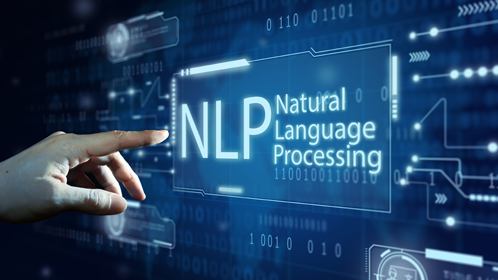
Fine-Tuning LLMs
LLMs can be adapted to specific needs by fine-tuning them with domain-specific data. Fine-tuning improves performance, enhances content generation, and ensures AI systems align with specialized applications, ensuring precision and efficiency.
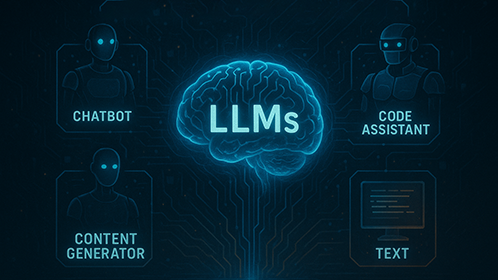
Deep Learning
Deep learning leverages neural networks to process complex data and improve accuracy in various fields. It plays a significant role in image recognition, natural language understanding, and predictive modeling, driving advancements in AI-driven automation and analysis.
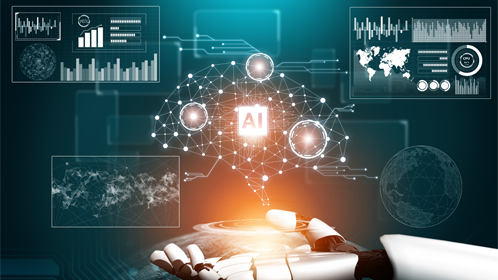
Predictive Analytics
By applying statistical models and machine learning techniques, predictive analytics helps anticipate trends and behaviors based on historical data. These insights support strategic planning, risk assessment, and decision-making across various domains.

Data Science
Data science involves collecting, cleaning, analyzing, and interpreting data to uncover meaningful insights. It integrates machine learning, statistical analysis, and computational techniques to enhance understanding and inform data-driven strategies.

Artificial Intelligence Services & Solutions
Artificial Intelligence leverages advanced machine learning to create intelligent and adaptable solutions. Understanding specific needs helps businesses improve efficiency, automate tasks, and enhance decision-making.
AI/ML Strategy Consulting
AI can be complex, but expert guidance helps businesses navigate its challenges. AI/ML strategy consulting provides clear direction on how to plan, develop, and integrate AI into business operations. By offering advice, research, and the best development approaches, consultants ensure AI is used effectively to drive long-term success and innovation.
PoC and MVP Development
Before launching a full AI product, a Proof of Concept (PoC) , a small-scale version checks if the AI model can achieve its goal. If successful, a Minimum Viable Product (MVP) is developed—a functional version for real users to test. This process ensures the final product is practical and market-ready.
Custom AI App Development
Building custom AI applications involves matching specific business needs, ensuring every part from user experience to AI model performs at its best. Prioritizing security and ethical AI practices ensures safe and responsible innovation. Custom AI solutions improve efficiency, automate tasks, and enhance user experiences in various industries.
AI Integration
AI can be added to existing business systems without disrupting operations. This integration allows companies to enhance workflows using AI-powered automation, data analysis, and decision-making tools. A well-planned AI integration improves productivity, reduces manual work, and drives innovation.
AI Agent/Copilot Development
AI-powered agents and copilots use powerful AI models like GPT-4o and Gemini and assist with complex tasks. Agents can automate workflows, analyze large amounts of data, generate content, and write code. AI copilots improve efficiency in customer support, business operations, and technical work by providing quick, intelligent solutions.
Generative AI Development
Create high-quality content, develop virtual assistants, and enhance customer interactions with GenAI. By using advanced AI models like GPT, Llama, and Gemini, businesses can generate text, images, and videos in a natural, human-like way to drive personalization and creative problem-solving.
Data Engineering
Data engineering focuses on collecting, cleaning, and organizing information so AI models can learn accurately. This process involves labeling, sorting, and preparing data for machine learning, ensuring AI-powered solutions are reliable and effective. A strong data foundation leads to better decision-making and smarter AI applications.
Innovate with Artificial Intelligence
Build innovative, scalable AI solutions tailored to your needs and drive business transformation.
Artificial Intelligence Industry Insights
From blogs to case studies, gain valuable insights into how businesses leverage technology to drive innovation, streamline operations, and create new growth opportunities.
AI in Transportation: Revolutionizing Mobility for a Smarter Future
Discover how AI is transforming the transportation industry by enhancing traffic management, optimizing routes, improving safety, and powering autonomous vehicles for a smarter, more efficient future.
AI Tech Stack: Choosing the Right Technology for Your Software
Understand the essential AI technology stack—from machine learning frameworks to cloud services—that enables businesses to build, deploy, and scale intelligent software solutions effectively.
AI In Manufacturing: Use Cases and Examples
Explore real-world AI applications in manufacturing, from predictive maintenance to quality control, that are boosting productivity, minimizing downtime, and driving operational excellence.
AI Business Strategy: A Guide for Your Company
Find out how businesses can craft a successful AI strategy, align AI initiatives with business goals, and unlock new growth opportunities while navigating challenges and risks.
AI for Legacy Application Modernization
Learn how AI-driven tools are revolutionizing legacy system upgrades by automating code analysis, streamlining migrations, and reducing costs, making businesses more agile and future-ready.
Artificial Intelligence Benefits
Unlock efficiency, accuracy, and innovation with AI. From automating tasks to enhancing decision-making, AI transforms industries and improves everyday experiences.
Smarter Decisions
AI helps businesses analyze data, predict trends, and make better choices. For example, online stores suggest products based on similar customers' purchases, and social media platforms adjust content based on user activity. AI continuously learns and improves decision-making.
Automation
AI automates tasks like sending emails, reminders, and receipts, saving businesses time. Online stores use automation to manage orders without storing inventory. This allows employees to focus on more important work.
Advance Healthcare
AI supports doctors in diagnosing and treating patients remotely. Apps help track health conditions, and medical records can be shared instantly between hospitals. AI allows healthcare workers to focus on patient care while handling routine tasks.
Better Customer Service
Chatbots quickly answer customer questions using natural language processing. AI also enhances security by protecting sensitive data with deep learning. As online security becomes more critical, AI-driven cybersecurity will continue to grow.
Faster Research & Data Analysis
AI speeds up research and helps businesses make thoughtful adjustments. For example, learning apps improve lessons based on user progress, and meal delivery services target emails at the best times. AI-driven insights save time and improve outcomes.
Handle Repetitive Tasks
AI tools like Grammarly fix writing errors, and email assistants schedule responses automatically. Businesses use robotic process automation (RPA) to handle tasks like managing inventory or processing invoices, freeing employees for more valuable work.
Reduce Errors
AI minimizes mistakes by detecting potential issues in real time. Factories improve product quality and safety, shipping companies reduce lost goods, and hospitals ensure test results are not overlooked. AI helps every industry work more efficiently.
Artificial Intelligence Development Process
A structured approach to building AI solutions, from understanding requirements and collecting data to model training, testing, and seamless integration. Continuous monitoring and updates ensure optimal performance and adaptability.
Requirement Gathering
Begin by identifying your AI app’s goals and gathering relevant data like user behavior and interactions to ensure the app aligns with your needs.
Data Preparation
Collect, clean, and organize data to ensure accuracy and proper structure, laying a strong foundation for the AI model’s learning and functionality.
Model
Training
Select suitable AI models based on your app’s objectives and train them with your data to enable key features like predictive insights or personalized recommendations.
Performance Optimization
Thoroughly test the AI app to validate its predictions and responses, ensuring accuracy and reliability before deployment.
Artificial Intelligence Tech Capabilities
Leveraging powerful AI technologies like NLP, computer vision, image analysis, and real-time data tools to build smarter, faster, and more effective products and solutions.
AI-Powered APIs & SDKs
Ready-to-integrate APIs and developer toolkits that embed AI capabilities such as diagnosis support, patient triaging, symptom checking, and report analysis directly into healthcare applications and workflows.
Preprocessing Pipelines
Robust pipelines that clean, normalize, and transform complex medical data—from imaging to unstructured clinical notes—ensure high-quality input for AI models and consistent, reliable outputs.
Cloud-Based AI Infrastructure
Leveraging scalable cloud platforms (Azure, AWS, GCP), we enable secure, high-performance environments for training, testing, and deploying AI models across healthcare use cases, from diagnostics to operations.
Retrieval-Augmented Generation (RAG)
Combines live data retrieval with generative AI to deliver accurate, context-aware responses. Ideal for healthcare scenarios like medical Q&A, clinical summarization, and decision support.
Interoperability & EHR Integration
Seamlessly connect with existing hospital systems, Electronic Health Records (EHRs), and industry standards like HL7 and FHIR, ensuring data continuity and smarter workflows without disruption.
Responsible AI & Regulatory Compliance
Ethical frameworks with healthcare regulations like HIPAA, CDSCO, and GDPR. We prioritize explainability, transparency, and fairness to ensure trust and safety in clinical environments.
FAQs
Can AI be integrated into existing systems?
What are the risks of AI development, and how can they be managed?
How much data is needed to train an AI model?
What kind of maintenance do AI systems require?
How do AI applications handle data privacy and security?
How do AI models work?
How much does it cost to develop an AI solution?
The cost varies based on complexity, level of customization, and infrastructure needs. Basic AI features may be more affordable, while advanced AI models and enterprise solutions can be more expensive. AI consulting costs can also vary depending on expertise and location.
Blogs
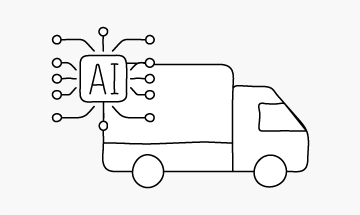
In recent years, artificial intelligence has emerged as a transformative
- Utpal Vaishnav
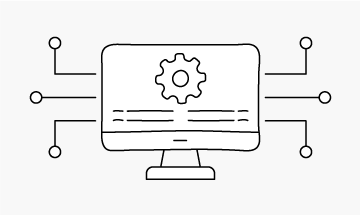
Legacy systems were once essential for businesses but now create
- Utpal Vaishnav

Artificial Intelligence (AI) is transforming the manufacturing industry, making factories
- Utpal Vaishnav
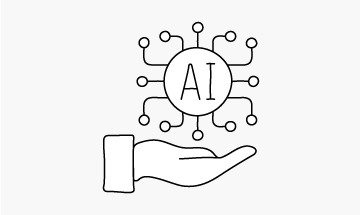
What Generative AI Means Generative AI refers to artificial intelligence
- Utpal Vaishnav
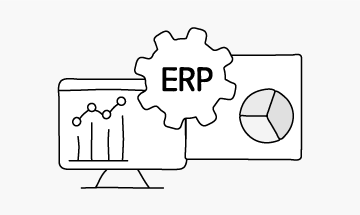
Selecting the proper enterprise resource planning (ERP) software is critical
- Utpal Vaishnav
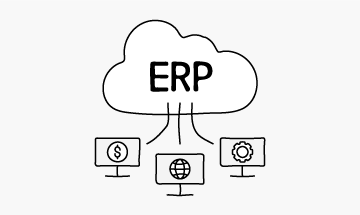
Implementing an Enterprise Resource Planning (ERP) system is a significant
- Utpal Vaishnav
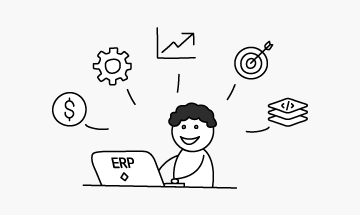
Enterprise Resource Planning (ERP) systems have become critical for organizational
- Utpal Vaishnav
Contact Us
India Office
3rd Floor, D Block, Satyam Corporate Square, SBR, Bodakdev, Ahmedabad, Gujarat 380054
Europe Office
Herengracht 449 A, 1017BR Amsterdam
Singapore Office
160 Robinson Road, #14-04 Singapore Business Federation Centre, Singapore 068914